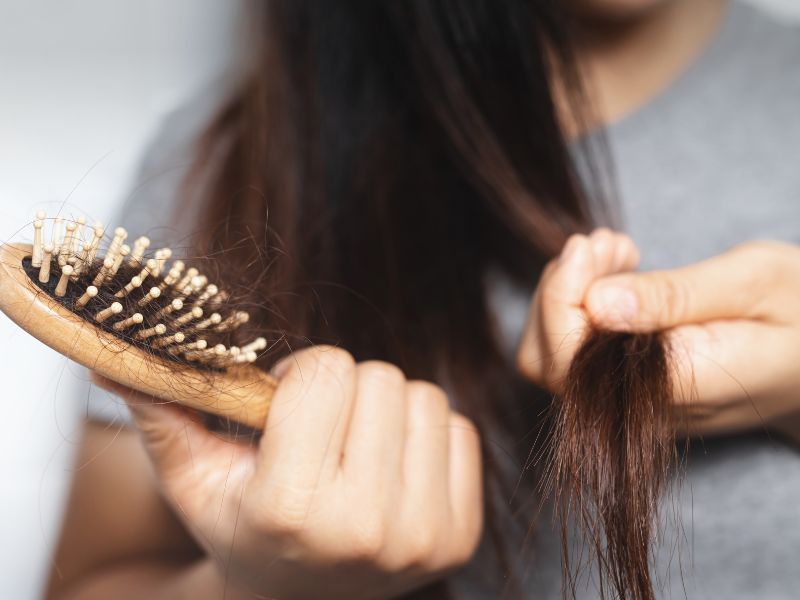Dry hair is a problem that many people struggle with, leaving strands feeling rough, brittle, and lifeless. Unlike healthy hair that reflects light and maintains natural softness, dry hair often looks dull, frizzy, and unmanageable. This condition occurs when your hair lacks sufficient moisture or is unable to retain it, and while it may seem like a simple cosmetic concern, persistent dryness can also indicate deeper issues with hair health. To achieve stronger, shinier, and more resilient locks, it is important to understand the underlying causes of dryness and the best ways to repair and protect your hair.
Finding the right dry hair treatment starts with identifying what is making your hair dry in the first place. From environmental factors to styling habits and even nutrition, many aspects of daily life can strip hair of its natural moisture. Thankfully, a combination of natural remedies, proper hydration, and targeted hair care tips can restore softness and shine. By making small but consistent changes, you can prevent further damage, strengthen your strands, and enjoy hair that not only looks better but feels healthier from root to tip.

Common Causes of Dry Hair
Dry hair often develops when the hair shaft is unable to retain enough moisture to stay soft and flexible. This problem can be influenced by both external conditions and internal factors that slowly strip away the natural oils responsible for keeping hair healthy. Recognizing the most common culprits behind dryness is essential to building a routine that not only restores hydration but also prevents recurring damage. By understanding what is causing the issue, you can take proactive steps toward achieving stronger, smoother, and more manageable hair.
Key Factors That Contribute to Dry Hair:
-
Environmental exposure: Constant sun, strong winds, and dry climates can sap natural oils, leaving hair brittle and rough to the touch.
-
Heat styling: Regular use of blow dryers, flat irons, or curling irons breaks down the hair cuticle and accelerates moisture loss.
-
Chemical treatments: Coloring, bleaching, perming, and relaxing weaken the hair shaft and strip away hydration over time.
-
Harsh hair products: Shampoos with sulfates or alcohol-based gels and sprays remove protective oils that keep hair nourished.
-
Over-washing: Washing too often disrupts the natural oil balance of your scalp, resulting in dull and dry strands.
-
Poor diet: Lack of proteins, vitamins, and omega fatty acids reduces your body’s ability to supply nutrients needed for hydrated, shiny hair.
-
Underlying health conditions: Issues such as thyroid imbalance, hormonal changes, or dehydration can manifest in consistently dry, fragile hair.
Learning the causes of dry hair allows you to create a more targeted plan to fix the problem and avoid habits that worsen it. When you identify whether your dryness comes from external stressors, daily routines, or internal health, you are better equipped to select the right dry hair treatments and lifestyle changes. This foundation makes it possible to restore your hair’s natural shine, softness, and resilience while preventing future dryness from recurring.

Best Dry Hair Treatments and Remedies
Addressing dry hair requires a combination of repairing treatments, nourishing ingredients, and consistent care routines that help restore lost moisture. While the causes of dry hair can vary, the right remedies focus on strengthening the cuticle, locking in hydration, and protecting strands from further damage. Whether you prefer natural methods or salon-grade products, having an array of effective options ensures you can create a customized routine that best suits your needs.
Effective Remedies for Treating Dry Hair:
-
Deep conditioning masks: These treatments penetrate the hair shaft with intense hydration, replenishing moisture and smoothing the cuticle for softness and shine.
-
Leave-in conditioners: Lightweight formulas provide all-day hydration while also helping to detangle and protect hair from environmental stressors.
-
Natural oils: Coconut oil, argan oil, and olive oil deliver nourishment by sealing in moisture and providing essential fatty acids for stronger, healthier hair.
-
Protein treatments: Strengthening masks with keratin or hydrolyzed protein help repair weak, brittle strands while preventing further breakage.
-
Sulfate-free shampoos: Using gentle cleansers designed for dry hair helps preserve natural oils while still keeping your scalp clean and balanced.
-
Overnight treatments: Applying hydrating creams or oils before bed allows nutrients to deeply absorb, resulting in softer, more manageable hair by morning.
-
Protective styling: Choosing hairstyles that minimize friction and breakage can reduce further damage and give your hair time to recover.
The best dry hair treatments not only replenish moisture but also reinforce your hair against future dryness. Incorporating these remedies into your weekly or monthly care routine makes a significant difference in how your strands look and feel. With consistent use, you can transform dull, brittle hair into a smoother, more nourished version of itself while preventing long-term damage.

How to Fix Dry Hair in Your Daily Routine
Managing dry hair is not just about occasional treatments but also about the everyday habits and choices that support long-term hydration and strength. From how often you wash your hair to the products you apply, your daily routine has a major impact on whether your strands remain dry and brittle or soft and manageable. Making small but consistent adjustments creates a strong foundation for healthier hair over time.
Daily Practices to Repair and Prevent Dryness:
-
Gentle cleansing habits: Wash your hair only as often as needed, using a hydrating, sulfate-free shampoo that maintains natural oils instead of stripping them away.
-
Regular conditioning: Always follow up shampoo with a moisturizing conditioner, focusing on mid-lengths to ends where dryness is most common.
-
Heat protection: Before using styling tools like blow dryers or flat irons, apply a heat protectant spray to shield your strands from moisture loss and damage.
-
Hydration with leave-in products: Incorporate a nourishing leave-in conditioner or lightweight oil to provide continuous hydration throughout the day.
-
Avoiding over-brushing: Use wide-tooth combs or soft-bristle brushes to detangle gently, reducing breakage and preventing frizz.
-
Silk or satin pillowcases: Sleeping on smoother fabrics helps reduce friction, preserving moisture and preventing split ends or roughness.
-
Balanced water intake: Drinking enough water each day supports hydration from the inside out, directly benefiting your hair’s softness and strength.
Adjusting your daily hair care routine with these practical habits helps prevent dryness before it escalates into brittleness or breakage. By making moisture-focused care part of your everyday lifestyle, your strands will become more resilient, shinier, and healthier over time. This consistent attention to your hair ensures that quick fixes turn into lasting results.

Long-Term Dry Hair Care Tips
Caring for dry hair effectively requires more than just quick fixes; it depends on maintaining healthy habits and strategies over time. Long-term care ensures that your hair not only regains moisture and strength but also remains resilient against future dryness and damage. By combining the right products, lifestyle choices, and protective methods, you create a routine that strengthens your strands and supports overall hair health in the years to come.
Strategies for Long-Term Dry Hair Care:
-
Consistent deep conditioning: Use a deep conditioner or hair mask at least once a week to replenish hydration and repair damage caused by styling or environmental stressors.
-
Protective styling: Incorporate hairstyles that reduce tension and exposure, such as braids, buns, or twists, to minimize breakage and preserve moisture.
-
Limit chemical treatments: Avoid excessive coloring, relaxing, or perming, as these can weaken hair structure and contribute to long-term dryness and brittleness.
-
Seasonal adjustments: Modify your hair care routine with the seasons, adding richer products in winter and lighter options in humid months to maintain balance.
-
Scalp nourishment: Massage the scalp regularly with natural oils or lightweight serums to promote circulation, enhance hydration, and encourage healthy growth.
-
Regular trims: Schedule haircuts every 6 to 8 weeks to remove split ends and maintain strong, smooth strands.
-
Nutrient-rich diet: Support your hair from within by consuming foods high in vitamins, minerals, and healthy fats that boost shine and reduce dryness.
Focusing on long-term solutions instead of only temporary fixes ensures your hair stays soft, smooth, and strong in the face of daily challenges. Over time, these practices help you not only restore the health of dry strands but also prevent damage from recurring, giving you consistently vibrant and resilient hair.
Addressing dry hair starts with understanding the causes and following consistent treatments that nourish, repair, and protect your strands. With the right combination of home remedies, daily routines, and long-term care, it’s possible to restore softness, shine, and strength while preventing future dryness. At Kpure, we specialize in high-quality hair care solutions designed to keep your hair healthy and hydrated. Contact us today to explore our collection and discover the best products tailored for your hair care needs.


